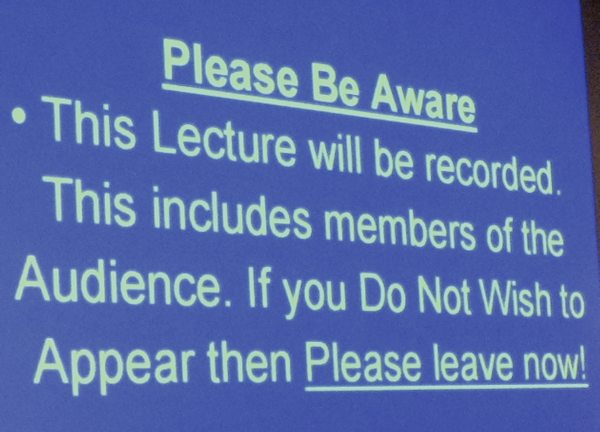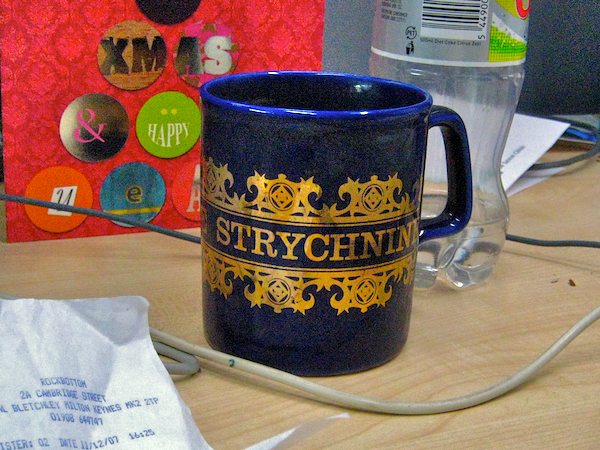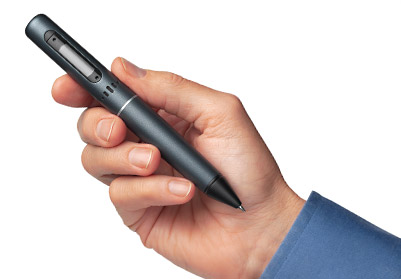
Shot with a 200mm lens in an idle moment.

Shot with a 200mm lens in an idle moment.

I went to a couple of very good lectures the other day — by Etienne Wenger and Yrjo Engestrom. Before the show started, however, this mysterious message was flashed onto the screen. What could it mean? That it was disgraceful to be seen in such company? It’s a truly idiotic notice.

Spotted on the desk of the colleague who is currently editing my stuff. Surely it can’t be that bad? According to Wikipedia, strychnine is a very toxic, colorless crystalline alkaloid used as a pesticide, particularly for killing small vertebrates such as rodents.
Richard Williams is not impressed by the decision to appoint a new England manager with such indecent haste.
Capello is one of the great club coaches and his brusque intelligence may just be what this generation of England players need. If England are going to employ another foreigner, he is as good as they come. But did the FA really need to seize the time quite so urgently?
Here was the opportunity to recognise the failure to reach next summer’s Euro 2008 finals as a real blessing, albeit in very heavy disguise. A period without competitive fixtures could have been used for rigorous consideration of the factors that have led the England team to such a pass, in particular the terrible paucity of plausible English candidates for McClaren’s job. This is the major fault-line running through the foundations of the English game, and the FA would have done well to acknowledge it by avoiding the temptation to make an instant high-profile appointment, announcing instead its intention to search for a radical solution…
I am chronically uninterested in sport, but I love intelligent writing. Which is why I read Richard Williams.
Vivid account by Bridget O’Donnell, a mother who happened to be on holiday in Portugal in the same group as the McCann family when their daughter was abducted.
We lay by the members-only pool staring at the sky. Round and round, the helicopters clacked and roared. Their cameras pointed down at us, mocking the walled and gated enclave. Circles rippled out across the pool. It was the morning after Madeleine went.
Six days earlier we had landed at Faro airport. The coach was full of people like us, parents lugging multiple toddler/baby combinations. All of us had risen at dawn, rushed along motorways and hurtled across the sky in search of the modern solution to our exhaustion – the Mark Warner kiddie club. I travelled with my partner Jes, our three-year-old daughter, and our nine-month-old baby son. Praia da Luz was the nearest Mark Warner beach resort and this was the cheapest week of the year – a bargain bucket trip, for a brief lie-down…
It’s a very good piece, which makes no attempt to exploit the experience. And she donated her fee to the Find Madeleine fund.
Interesting comment by Feli Di Giorgio in a Lightstalkers discussion.
Digital has lower noise (grain) and better color accuracy, especially in mixed light.
Digital ‘sees’ deeper into the shadows and film handles highlights better,
Film negative has greater exposure range, 10-18 stops depending on whom you believe.
Digital has more dynamic range than slide film , but less than negative. With the exception of the Finpix S5 Pro, pretty much every DSLR on the market delivers about 8 stops of usable dynamic range. Usable being the keyword here. The Finepix S5 PRO gets 10 stops, because of it’s high dynamic range SuperCCD, but it’s only 6MP.
Film also tends to have greater color resolution, but that is changing as manufacturers up the resolution of their A/D circuitry, which will also increase the useable dynamic range. There is a noticeable difference between the results you get with a 12bit and 16bit A/D converter.
One reason why the M8 may deliver more film-like images is due to it’s use of a CCD, rather than a CMOS chip. CCD’s tend to deliver images that have a more film like quality.
I’ve seen tests where the 16MP Canon 1Ds MkII runs neck to neck with a 6×7 negative and delivers less grain over 400asa. The film negative will have better tonality and greater dynamic range.
But in the end they are different media, like oil paint and acrylics. I prefer the look of Tri-X, so that’s what I shoot. Sometimes digtal is the better choice. I just use the tool that offers the best solution for the job.
Fascinating glimpse by SecureWorks of the inner workings of a spamming botnet.
With the help of Spamhaus, we were able to not only shut down the command and control server, we were able to obtain the running software from the server, written in the Python language. Examining these showed that the Srizbi botnet is actually a working component of a piece of spamware known as “Reactor Mailer”. Reactor Mailer has been around at least since 2004, and is in its third major version. Versions 1 and 2 likely used proxy servers to relay the spam; however, since this is not as efficient as template-based spambots, version 3 was created along with Srizbi, the bot that actually does the mailing.
Reactor Mailer is the brainchild of a spammer who goes by the pseudonym “spm”. He calls his company “Elphisoft”, and has even been interviewed about his operation by the Russian hacker website xakep.ru. He claims to hire some of the best coders in the CIS (Commonwealth of Independent States, the post-Soviet confederation) to write the software. This claim is probably true – by examining details in the source code, we were able to identify at least one of the principal coders of Reactor 3/Srizbi, a Ukrainian who goes by the nickname “vlaman.” Various postings by vlaman indicate he is proficient in C and assembler, and would certainly be capable of writing the Srizbi trojan.
Reactor Mailer operates with a software-as-a-service model. Spammers are given accounts on a Reactor server, and use a web-based interface to manage their spam tasks. In the case of the Ron Paul spam, there was only one account on the server in addition to spm, which was named “nenastnyj”.
We loaded the Reactor Mailer software onto a test machine in order to recreate the interface as seen by the spammer…
Thanks to Tony Hirst for the link.

Hmmm… Yet another attempt to bridge the gap between paper and computer?
The Livescribe smartpen revolutionizes the act of writing by recording and linking audio to what you put on paper. Tap on words or drawings in your notes, and the smartpen replays recorded audio from the time you were writing. Transfer notes to your PC to backup, replay, and share them online.
O dear. It seems that HDTV has been causing alarm on planet Celeb.
Given that the nation is still struggling to get used to the idea of digital TV, it’s easy to get talk of “high definition” confused with all the other jargon that no one understands. In theory, high definition is what happens after digital. High-definition screens have more pixels making up the television picture, and said picture is created faster and in sharper definition. Every shot in high-definition is effectively a microscopic examination of skin complexion and condition, with even the tiniest imperfections becoming unbearably visible.
It’s tough out there, apparently. Here’s a review of Hilary Clinton and John McCain’s appearances on HD.
In high-def, Hillary looked remarkably masculine with thick eyebrows, David Spade-like haircut and a tan pants suit that could have gotten her into a Gertrude Stein poetry reading night without having to pay a cover. The overall look wasn’t helped by the fact that her neck was redder than the state of Alabama in the 2004 presidential election. She really needs to think about covering that thing up in future appearances. It looks raw and unhealthy in high-def.
Now, let’s get to McCain, who was on Tuesday night (August 28) on the Tonight Show With Jay Leno. McCain is now 71 years old and there’s no hiding it in high-def. He looks so feeble and doddering despite his best efforts to appear energetic. To make matters worse, he repeated an old joke that Sen. Bob Dole used to tell about having trouble sleeping at night: “I slept like a baby. I woke up every two hours crying.” When you’re trying to look fresh and young, you don’t quote someone even older than you. McCain likes to say he’s a maverick, but at this point, he looks older than the original maverick, James Garner.
Interesting aside to a discussion about the Leica M8:
As an aside on the whole sensor size issue—I guess there is some practical or economic limitation that keeps most sensors at 75% of the standard 135 film size, thus forcing all of the rethinking of lenses and such, but it’s interesting to note where the 35mm standard came from. Apparently, in 1889, Thomas Edison was developing the Kinetoscope and a worker asked him how wide to cut the film. He held up his thumb and forefinger and said “About this wide…” and the 35 millimeter standard was born…